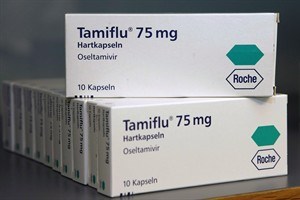
Packages of the medicine Tamiflu by Swiss pharmaceutical company Roche are seen in Stuttgart, Germany, on April 28, 2009. A new study says doubling the dose of the flu medication Tamiflu does not make a difference in severe flu infections.The results will be disappointing for doctors who had hoped for another option for treating severe influenza, but should stretch out drug supplies during a pandemic. THE CANADIAN PRESS/AP - Thomas Kienzle
May 30, 2013 - 4:27 PM
TORONTO - A new study says doubling the dose of the flu medication Tamiflu does not make a difference in severe flu infections.
The results will be disappointing for doctors who had hoped for another option for treating severe influenza, but should stretch out drug supplies during a pandemic.
The research was conducted in 13 hospitals in Indonesia, Singapore, Thailand and Vietnam from April 2007 and February 2010.
The study mostly involved severely ill children, who were randomly assigned to get either the regular dose of Tamiflu or a double dose of the drug.
Some of the patients in the trial were infected with seasonal influenza A viruses, others with flu B or the pandemic H1N1 virus and still others with H5N1 bird flu.
There were no differences in deaths, time in intensive care, time on supplemental oxygen or mechanical ventilation for the patients who got the double dose.
There are very few drugs for treating flu. So doctors treating gravely ill patients have tried doubling the dose, particularly for patients infected with the H5N1 virus.
Only 17 of the cases — five per cent of the 326 patients enrolled in the study — were sick with H5N1. As such, one cannot be sure that the double dose didn't help, two Australian influenza experts wrote in a commentary that accompanied the article. Both were published in the journal BMJ.
"What is clear is that double dose oseltamivir is unlikely to significantly improve the clinical outcomes of severe cases of seasonal influenza, although there were probably insufficient data to determine if this was also true for people infected with A(H5N1)," said Ian Barr and Aeron Hurt, of the World Health Organization's Collaborating Centre for Reference and Research on Influenza.
They said treatment options for seriously ill flu patients need to be expanded, especially given the recent emergency of H7N9 bird flu in China. That virus has infected 132 people, killing 37 of them.
News from © The Canadian Press, 2013